NRSG367 Assessment 2: Reflection on NSQHS Standards and Patient Care
VerifiedAdded on 2022/12/28
|6
|1551
|88
Report
AI Summary
This report analyzes the National Safety and Quality Health Service (NSQHS) standards, specifically focusing on preventing and controlling healthcare-associated infections and comprehensive care, through the lens of a nursing student's practical experiences. The report utilizes the 5R's reflection model (Reporting, Responding, Relating, Reasoning, and Reconstructing) to critically examine real-world scenarios encountered during a hospital internship. The student reflects on instances where infection control protocols were not followed, such as a doctor neglecting hand hygiene and proper PPE use during a dialysis procedure. The report also addresses medication safety, highlighting a case where a patient experienced cognitive impairment due to prescribed medication. By applying theoretical knowledge and referencing relevant literature, the student identifies ethical considerations, analyzes the impact of these incidents on patient safety, and proposes future actions to improve healthcare practices. The report emphasizes the importance of adhering to NSQHS standards, evidence-based practices, and ethical considerations to enhance the quality of care within the healthcare community.
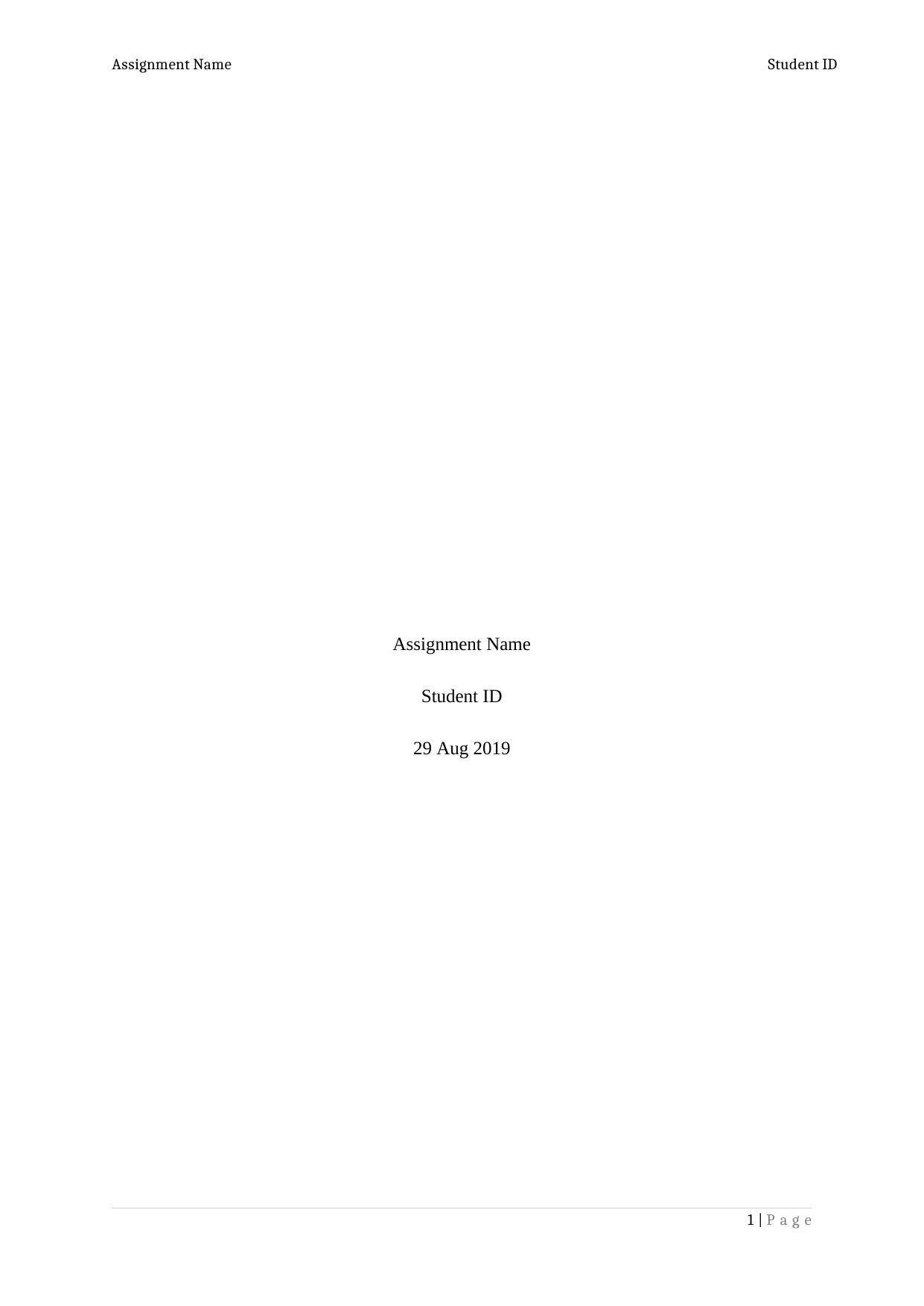
Assignment Name Student ID
Assignment Name
Student ID
29 Aug 2019
1 | P a g e
Assignment Name
Student ID
29 Aug 2019
1 | P a g e
Paraphrase This Document
Need a fresh take? Get an instant paraphrase of this document with our AI Paraphraser
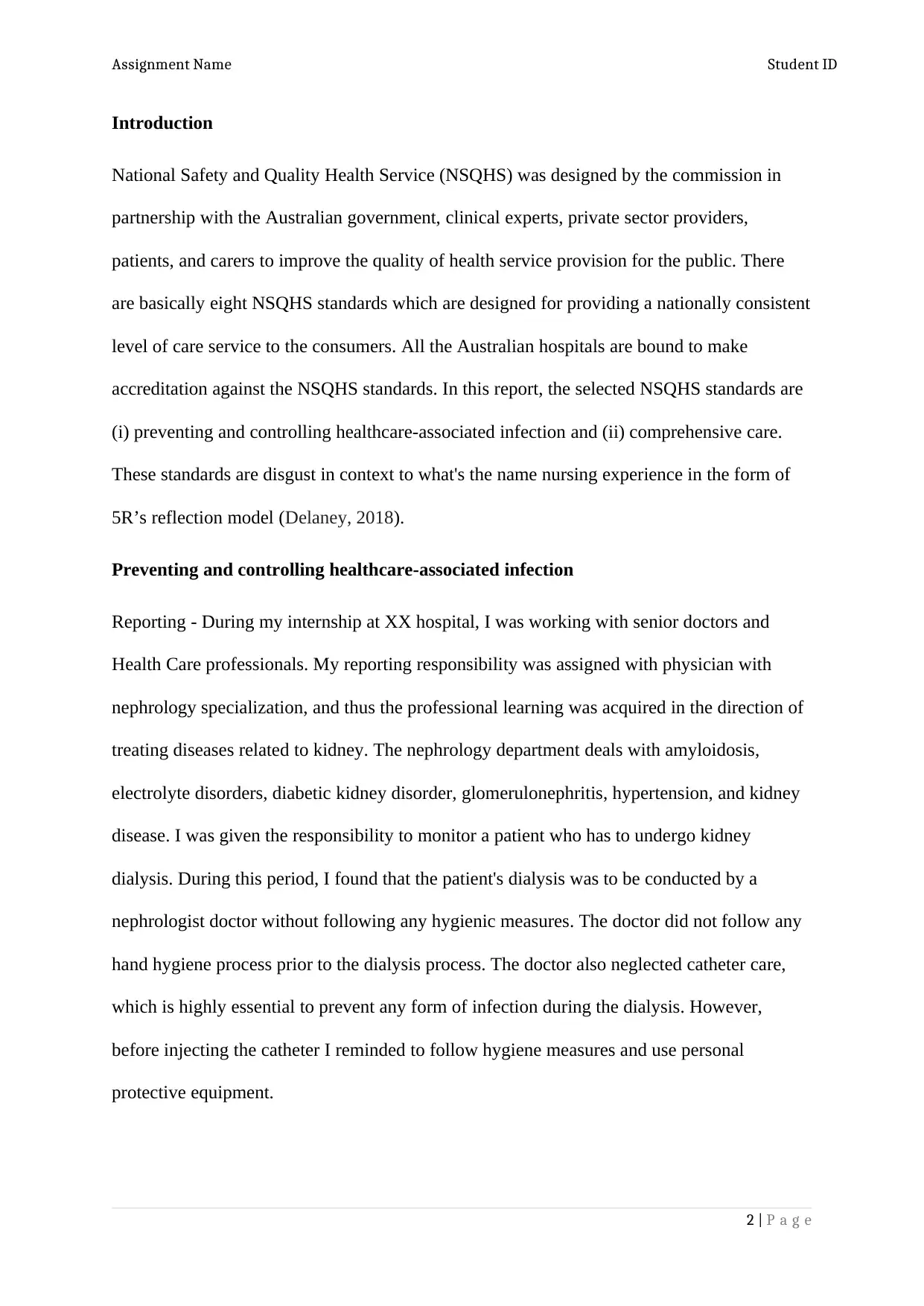
Assignment Name Student ID
Introduction
National Safety and Quality Health Service (NSQHS) was designed by the commission in
partnership with the Australian government, clinical experts, private sector providers,
patients, and carers to improve the quality of health service provision for the public. There
are basically eight NSQHS standards which are designed for providing a nationally consistent
level of care service to the consumers. All the Australian hospitals are bound to make
accreditation against the NSQHS standards. In this report, the selected NSQHS standards are
(i) preventing and controlling healthcare-associated infection and (ii) comprehensive care.
These standards are disgust in context to what's the name nursing experience in the form of
5R’s reflection model (Delaney, 2018).
Preventing and controlling healthcare-associated infection
Reporting - During my internship at XX hospital, I was working with senior doctors and
Health Care professionals. My reporting responsibility was assigned with physician with
nephrology specialization, and thus the professional learning was acquired in the direction of
treating diseases related to kidney. The nephrology department deals with amyloidosis,
electrolyte disorders, diabetic kidney disorder, glomerulonephritis, hypertension, and kidney
disease. I was given the responsibility to monitor a patient who has to undergo kidney
dialysis. During this period, I found that the patient's dialysis was to be conducted by a
nephrologist doctor without following any hygienic measures. The doctor did not follow any
hand hygiene process prior to the dialysis process. The doctor also neglected catheter care,
which is highly essential to prevent any form of infection during the dialysis. However,
before injecting the catheter I reminded to follow hygiene measures and use personal
protective equipment.
2 | P a g e
Introduction
National Safety and Quality Health Service (NSQHS) was designed by the commission in
partnership with the Australian government, clinical experts, private sector providers,
patients, and carers to improve the quality of health service provision for the public. There
are basically eight NSQHS standards which are designed for providing a nationally consistent
level of care service to the consumers. All the Australian hospitals are bound to make
accreditation against the NSQHS standards. In this report, the selected NSQHS standards are
(i) preventing and controlling healthcare-associated infection and (ii) comprehensive care.
These standards are disgust in context to what's the name nursing experience in the form of
5R’s reflection model (Delaney, 2018).
Preventing and controlling healthcare-associated infection
Reporting - During my internship at XX hospital, I was working with senior doctors and
Health Care professionals. My reporting responsibility was assigned with physician with
nephrology specialization, and thus the professional learning was acquired in the direction of
treating diseases related to kidney. The nephrology department deals with amyloidosis,
electrolyte disorders, diabetic kidney disorder, glomerulonephritis, hypertension, and kidney
disease. I was given the responsibility to monitor a patient who has to undergo kidney
dialysis. During this period, I found that the patient's dialysis was to be conducted by a
nephrologist doctor without following any hygienic measures. The doctor did not follow any
hand hygiene process prior to the dialysis process. The doctor also neglected catheter care,
which is highly essential to prevent any form of infection during the dialysis. However,
before injecting the catheter I reminded to follow hygiene measures and use personal
protective equipment.
2 | P a g e
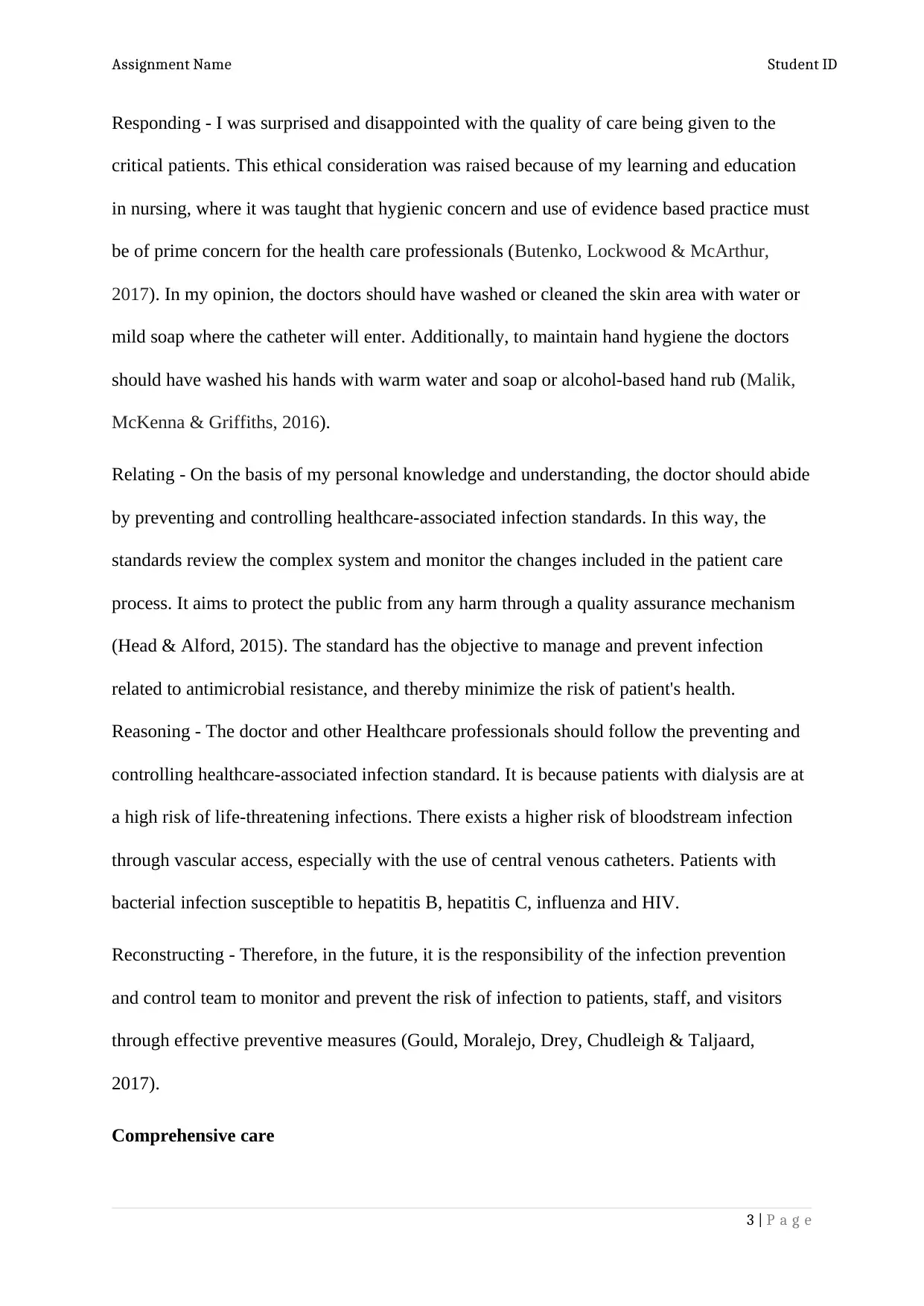
Assignment Name Student ID
Responding - I was surprised and disappointed with the quality of care being given to the
critical patients. This ethical consideration was raised because of my learning and education
in nursing, where it was taught that hygienic concern and use of evidence based practice must
be of prime concern for the health care professionals (Butenko, Lockwood & McArthur,
2017). In my opinion, the doctors should have washed or cleaned the skin area with water or
mild soap where the catheter will enter. Additionally, to maintain hand hygiene the doctors
should have washed his hands with warm water and soap or alcohol-based hand rub (Malik,
McKenna & Griffiths, 2016).
Relating - On the basis of my personal knowledge and understanding, the doctor should abide
by preventing and controlling healthcare-associated infection standards. In this way, the
standards review the complex system and monitor the changes included in the patient care
process. It aims to protect the public from any harm through a quality assurance mechanism
(Head & Alford, 2015). The standard has the objective to manage and prevent infection
related to antimicrobial resistance, and thereby minimize the risk of patient's health.
Reasoning - The doctor and other Healthcare professionals should follow the preventing and
controlling healthcare-associated infection standard. It is because patients with dialysis are at
a high risk of life-threatening infections. There exists a higher risk of bloodstream infection
through vascular access, especially with the use of central venous catheters. Patients with
bacterial infection susceptible to hepatitis B, hepatitis C, influenza and HIV.
Reconstructing - Therefore, in the future, it is the responsibility of the infection prevention
and control team to monitor and prevent the risk of infection to patients, staff, and visitors
through effective preventive measures (Gould, Moralejo, Drey, Chudleigh & Taljaard,
2017).
Comprehensive care
3 | P a g e
Responding - I was surprised and disappointed with the quality of care being given to the
critical patients. This ethical consideration was raised because of my learning and education
in nursing, where it was taught that hygienic concern and use of evidence based practice must
be of prime concern for the health care professionals (Butenko, Lockwood & McArthur,
2017). In my opinion, the doctors should have washed or cleaned the skin area with water or
mild soap where the catheter will enter. Additionally, to maintain hand hygiene the doctors
should have washed his hands with warm water and soap or alcohol-based hand rub (Malik,
McKenna & Griffiths, 2016).
Relating - On the basis of my personal knowledge and understanding, the doctor should abide
by preventing and controlling healthcare-associated infection standards. In this way, the
standards review the complex system and monitor the changes included in the patient care
process. It aims to protect the public from any harm through a quality assurance mechanism
(Head & Alford, 2015). The standard has the objective to manage and prevent infection
related to antimicrobial resistance, and thereby minimize the risk of patient's health.
Reasoning - The doctor and other Healthcare professionals should follow the preventing and
controlling healthcare-associated infection standard. It is because patients with dialysis are at
a high risk of life-threatening infections. There exists a higher risk of bloodstream infection
through vascular access, especially with the use of central venous catheters. Patients with
bacterial infection susceptible to hepatitis B, hepatitis C, influenza and HIV.
Reconstructing - Therefore, in the future, it is the responsibility of the infection prevention
and control team to monitor and prevent the risk of infection to patients, staff, and visitors
through effective preventive measures (Gould, Moralejo, Drey, Chudleigh & Taljaard,
2017).
Comprehensive care
3 | P a g e
⊘ This is a preview!⊘
Do you want full access?
Subscribe today to unlock all pages.

Trusted by 1+ million students worldwide
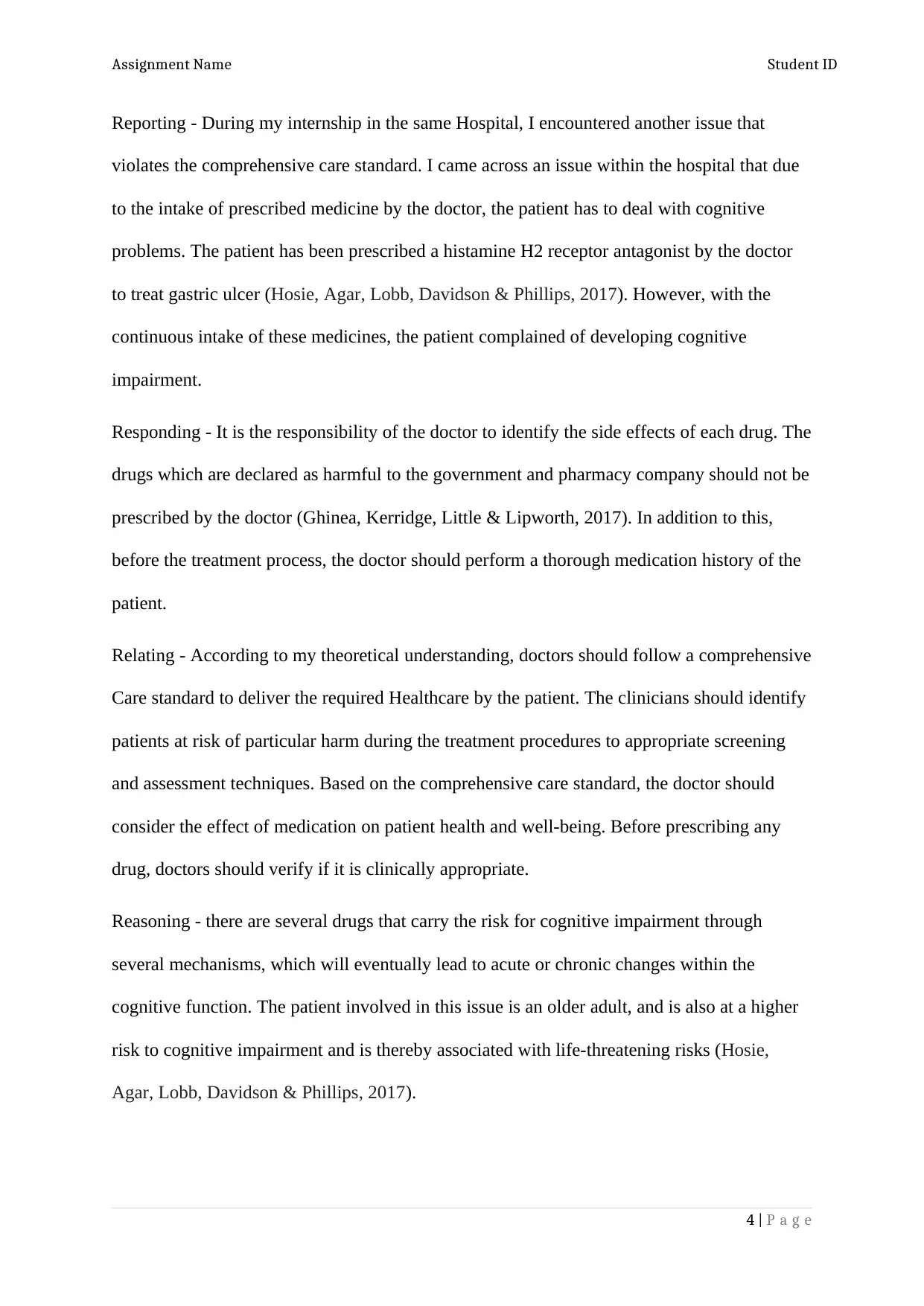
Assignment Name Student ID
Reporting - During my internship in the same Hospital, I encountered another issue that
violates the comprehensive care standard. I came across an issue within the hospital that due
to the intake of prescribed medicine by the doctor, the patient has to deal with cognitive
problems. The patient has been prescribed a histamine H2 receptor antagonist by the doctor
to treat gastric ulcer (Hosie, Agar, Lobb, Davidson & Phillips, 2017). However, with the
continuous intake of these medicines, the patient complained of developing cognitive
impairment.
Responding - It is the responsibility of the doctor to identify the side effects of each drug. The
drugs which are declared as harmful to the government and pharmacy company should not be
prescribed by the doctor (Ghinea, Kerridge, Little & Lipworth, 2017). In addition to this,
before the treatment process, the doctor should perform a thorough medication history of the
patient.
Relating - According to my theoretical understanding, doctors should follow a comprehensive
Care standard to deliver the required Healthcare by the patient. The clinicians should identify
patients at risk of particular harm during the treatment procedures to appropriate screening
and assessment techniques. Based on the comprehensive care standard, the doctor should
consider the effect of medication on patient health and well-being. Before prescribing any
drug, doctors should verify if it is clinically appropriate.
Reasoning - there are several drugs that carry the risk for cognitive impairment through
several mechanisms, which will eventually lead to acute or chronic changes within the
cognitive function. The patient involved in this issue is an older adult, and is also at a higher
risk to cognitive impairment and is thereby associated with life-threatening risks (Hosie,
Agar, Lobb, Davidson & Phillips, 2017).
4 | P a g e
Reporting - During my internship in the same Hospital, I encountered another issue that
violates the comprehensive care standard. I came across an issue within the hospital that due
to the intake of prescribed medicine by the doctor, the patient has to deal with cognitive
problems. The patient has been prescribed a histamine H2 receptor antagonist by the doctor
to treat gastric ulcer (Hosie, Agar, Lobb, Davidson & Phillips, 2017). However, with the
continuous intake of these medicines, the patient complained of developing cognitive
impairment.
Responding - It is the responsibility of the doctor to identify the side effects of each drug. The
drugs which are declared as harmful to the government and pharmacy company should not be
prescribed by the doctor (Ghinea, Kerridge, Little & Lipworth, 2017). In addition to this,
before the treatment process, the doctor should perform a thorough medication history of the
patient.
Relating - According to my theoretical understanding, doctors should follow a comprehensive
Care standard to deliver the required Healthcare by the patient. The clinicians should identify
patients at risk of particular harm during the treatment procedures to appropriate screening
and assessment techniques. Based on the comprehensive care standard, the doctor should
consider the effect of medication on patient health and well-being. Before prescribing any
drug, doctors should verify if it is clinically appropriate.
Reasoning - there are several drugs that carry the risk for cognitive impairment through
several mechanisms, which will eventually lead to acute or chronic changes within the
cognitive function. The patient involved in this issue is an older adult, and is also at a higher
risk to cognitive impairment and is thereby associated with life-threatening risks (Hosie,
Agar, Lobb, Davidson & Phillips, 2017).
4 | P a g e
Paraphrase This Document
Need a fresh take? Get an instant paraphrase of this document with our AI Paraphraser
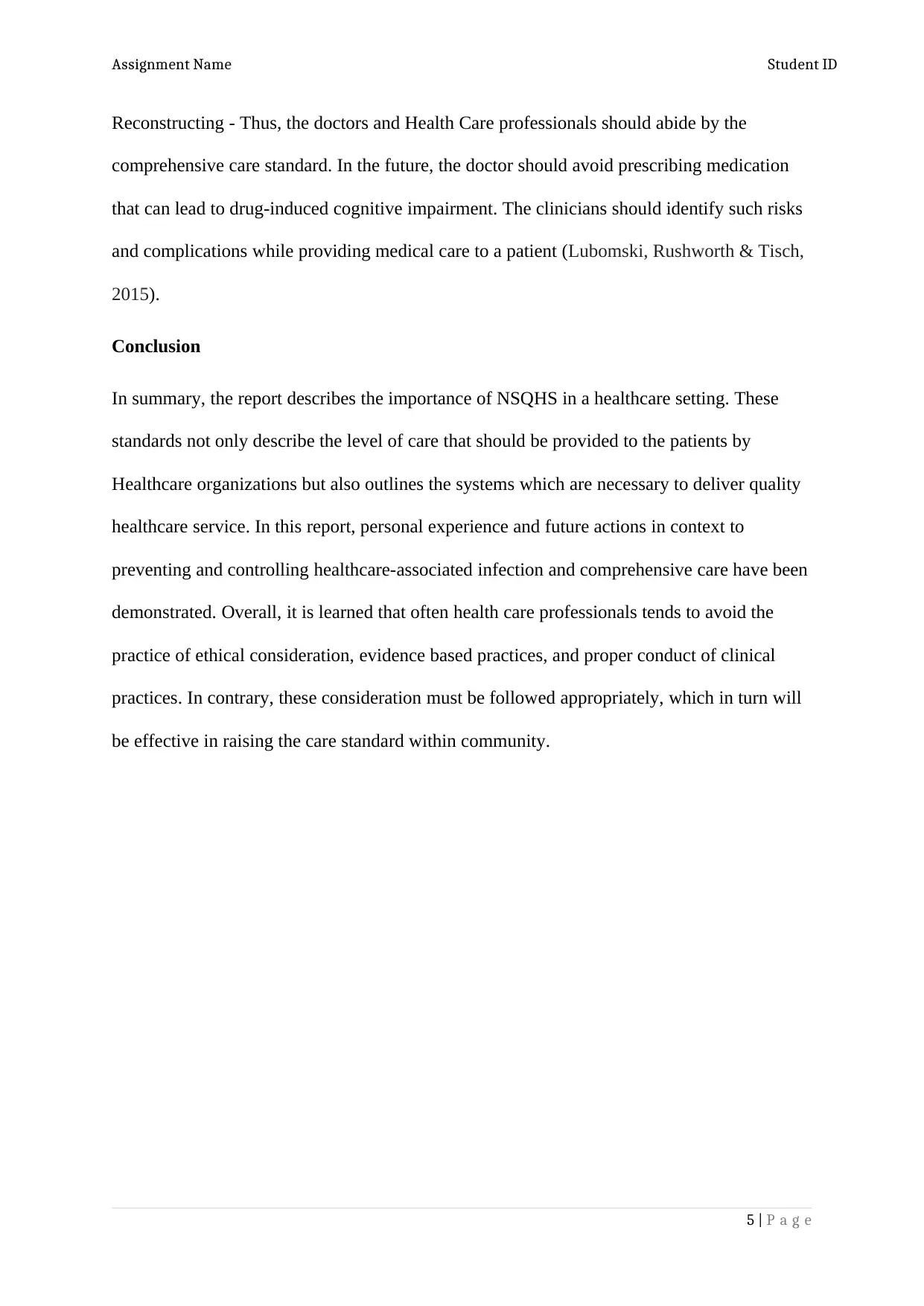
Assignment Name Student ID
Reconstructing - Thus, the doctors and Health Care professionals should abide by the
comprehensive care standard. In the future, the doctor should avoid prescribing medication
that can lead to drug-induced cognitive impairment. The clinicians should identify such risks
and complications while providing medical care to a patient (Lubomski, Rushworth & Tisch,
2015).
Conclusion
In summary, the report describes the importance of NSQHS in a healthcare setting. These
standards not only describe the level of care that should be provided to the patients by
Healthcare organizations but also outlines the systems which are necessary to deliver quality
healthcare service. In this report, personal experience and future actions in context to
preventing and controlling healthcare-associated infection and comprehensive care have been
demonstrated. Overall, it is learned that often health care professionals tends to avoid the
practice of ethical consideration, evidence based practices, and proper conduct of clinical
practices. In contrary, these consideration must be followed appropriately, which in turn will
be effective in raising the care standard within community.
5 | P a g e
Reconstructing - Thus, the doctors and Health Care professionals should abide by the
comprehensive care standard. In the future, the doctor should avoid prescribing medication
that can lead to drug-induced cognitive impairment. The clinicians should identify such risks
and complications while providing medical care to a patient (Lubomski, Rushworth & Tisch,
2015).
Conclusion
In summary, the report describes the importance of NSQHS in a healthcare setting. These
standards not only describe the level of care that should be provided to the patients by
Healthcare organizations but also outlines the systems which are necessary to deliver quality
healthcare service. In this report, personal experience and future actions in context to
preventing and controlling healthcare-associated infection and comprehensive care have been
demonstrated. Overall, it is learned that often health care professionals tends to avoid the
practice of ethical consideration, evidence based practices, and proper conduct of clinical
practices. In contrary, these consideration must be followed appropriately, which in turn will
be effective in raising the care standard within community.
5 | P a g e
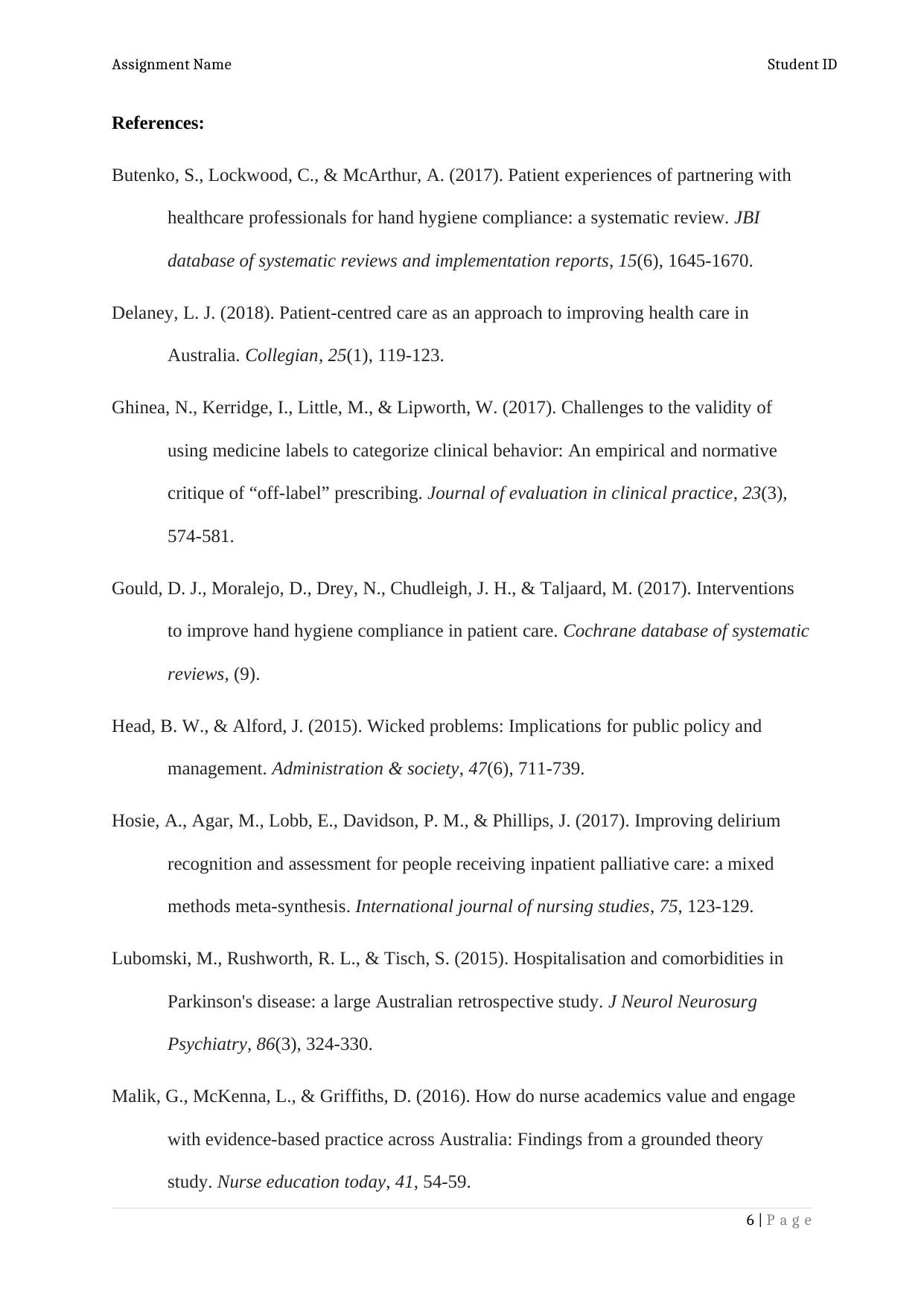
Assignment Name Student ID
References:
Butenko, S., Lockwood, C., & McArthur, A. (2017). Patient experiences of partnering with
healthcare professionals for hand hygiene compliance: a systematic review. JBI
database of systematic reviews and implementation reports, 15(6), 1645-1670.
Delaney, L. J. (2018). Patient-centred care as an approach to improving health care in
Australia. Collegian, 25(1), 119-123.
Ghinea, N., Kerridge, I., Little, M., & Lipworth, W. (2017). Challenges to the validity of
using medicine labels to categorize clinical behavior: An empirical and normative
critique of “off‐label” prescribing. Journal of evaluation in clinical practice, 23(3),
574-581.
Gould, D. J., Moralejo, D., Drey, N., Chudleigh, J. H., & Taljaard, M. (2017). Interventions
to improve hand hygiene compliance in patient care. Cochrane database of systematic
reviews, (9).
Head, B. W., & Alford, J. (2015). Wicked problems: Implications for public policy and
management. Administration & society, 47(6), 711-739.
Hosie, A., Agar, M., Lobb, E., Davidson, P. M., & Phillips, J. (2017). Improving delirium
recognition and assessment for people receiving inpatient palliative care: a mixed
methods meta-synthesis. International journal of nursing studies, 75, 123-129.
Lubomski, M., Rushworth, R. L., & Tisch, S. (2015). Hospitalisation and comorbidities in
Parkinson's disease: a large Australian retrospective study. J Neurol Neurosurg
Psychiatry, 86(3), 324-330.
Malik, G., McKenna, L., & Griffiths, D. (2016). How do nurse academics value and engage
with evidence-based practice across Australia: Findings from a grounded theory
study. Nurse education today, 41, 54-59.
6 | P a g e
References:
Butenko, S., Lockwood, C., & McArthur, A. (2017). Patient experiences of partnering with
healthcare professionals for hand hygiene compliance: a systematic review. JBI
database of systematic reviews and implementation reports, 15(6), 1645-1670.
Delaney, L. J. (2018). Patient-centred care as an approach to improving health care in
Australia. Collegian, 25(1), 119-123.
Ghinea, N., Kerridge, I., Little, M., & Lipworth, W. (2017). Challenges to the validity of
using medicine labels to categorize clinical behavior: An empirical and normative
critique of “off‐label” prescribing. Journal of evaluation in clinical practice, 23(3),
574-581.
Gould, D. J., Moralejo, D., Drey, N., Chudleigh, J. H., & Taljaard, M. (2017). Interventions
to improve hand hygiene compliance in patient care. Cochrane database of systematic
reviews, (9).
Head, B. W., & Alford, J. (2015). Wicked problems: Implications for public policy and
management. Administration & society, 47(6), 711-739.
Hosie, A., Agar, M., Lobb, E., Davidson, P. M., & Phillips, J. (2017). Improving delirium
recognition and assessment for people receiving inpatient palliative care: a mixed
methods meta-synthesis. International journal of nursing studies, 75, 123-129.
Lubomski, M., Rushworth, R. L., & Tisch, S. (2015). Hospitalisation and comorbidities in
Parkinson's disease: a large Australian retrospective study. J Neurol Neurosurg
Psychiatry, 86(3), 324-330.
Malik, G., McKenna, L., & Griffiths, D. (2016). How do nurse academics value and engage
with evidence-based practice across Australia: Findings from a grounded theory
study. Nurse education today, 41, 54-59.
6 | P a g e
⊘ This is a preview!⊘
Do you want full access?
Subscribe today to unlock all pages.

Trusted by 1+ million students worldwide
1 out of 6
Related Documents
Your All-in-One AI-Powered Toolkit for Academic Success.
+13062052269
info@desklib.com
Available 24*7 on WhatsApp / Email
![[object Object]](/_next/static/media/star-bottom.7253800d.svg)
Unlock your academic potential
Copyright © 2020–2026 A2Z Services. All Rights Reserved. Developed and managed by ZUCOL.





